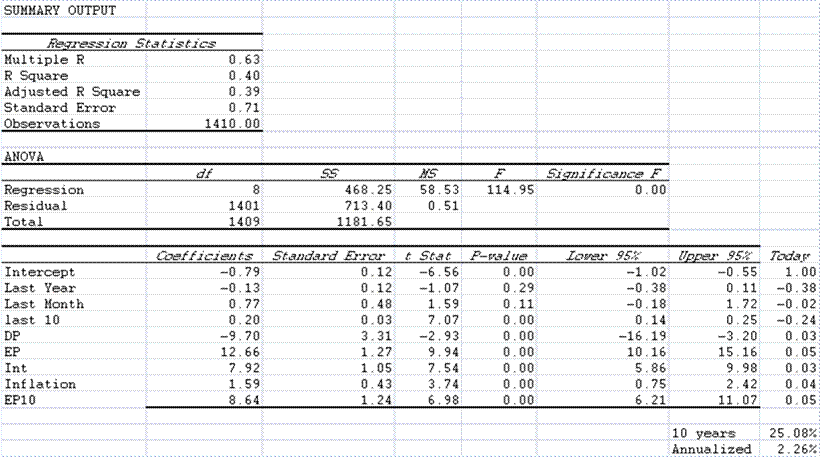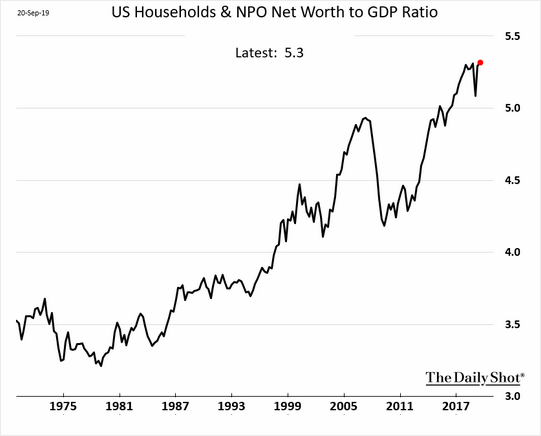Two Questions on Returns

============================================
I recently received two sets of questions from readers. Here we go:
David,
I am a one-time financial professional now running a modest ?home office? operation in the GHI?area.? I have been reading your blog posts for a couple years now, and genuinely appreciate your efforts to bring accessible, thoughtful, and modestly stated insights to a space too often lacking all three characteristics.? If I didn?t enjoy your financial posts so much, I?d request that you bring your approach to the political arena ? but that?s a different discussion altogether?
I am writing today with two questions about your work on the elegant market valuation approach you?ve credited to @Jesse_Livermore.?? I apologize in advance for any naivety evidenced by my lack of statistical background?
- I noticed that you constructed a ?homemade? total return index ? perhaps to get you data back to the 1950s.? Do you see any issue using SPXTR index (I see data back to 1986)?? The 10yr return r-squared appears to be above .91 vs. investor allocation variable since that date.
- The most current Fed/FRED data is from Q32016.? It appears that the Q42016 data will be released early March (including perhaps ?re-available? data sets for each of required components http://research.stlouisfed.org/fred2/graph/?g=qis ).? While I appreciate that the metric is not necessarily intended as a short-term market timing device, I am curious whether you have any interim device(s) you use to estimate data ? especially as the latest data approaches 6 months in age & the market has moved significantly?
I appreciate your thoughts & especially your continued posts?
JJJ
These questions are about the Estimating Future Stock Returns posts. ?On question 1, I am pulling the data from Shiller’s data. ?I don’t have a better data feed, but that should be the S&P 500 data, or pretty near it. ?It goes all the way back to the start of the Z.1 series, and I would rather keep things consistent, then try to fuse two similar series.
As for question 2, Making adjustments for time elapsed from the end of the quarter is important, because the estimate is stale by 70-165 days or so. ?I treat it like a 10-year zero coupon bond and look at the return since the end of the quarter. ?I could be more exact than this, adjusting for the exact period?and dividends, but the surprise from the unknown change in investor behavior which is larger than any of the adjustment simplifications. ?I take the return since the end of the last reported quarter and divide by ten, and subtract it from my ten year return estimate. ?Simple, understandable, and usable, particularly when the adjustment only has to wait for 3 more months to be refreshed.
PS — don’t suggest that I write on politics. ?I annoy too many people with my comments on that already. đ
Now for the next question:
I have a quick question. If an investor told you they wanted a 3% real return (i.e., return after inflation) on their investments, do you consider that conservative? Average? Aggressive? I was looking at some data and it seems on the conservative side.
EEE
Perhaps this should go in the “dirty secrets” bin. ?Many analyses get done using real return?statistics. ?I think those are bogus, because inflation and investment returns are weakly related when it comes to risk assets like stocks and any other investment with business risk, even in the long run. ?Cash and high-quality bonds are different. ?So are precious metals and commodities as a whole. ?Individual commodities that are not precious metals have returns that are weakly related to inflation. ?Their returns depend more on their individual pricing cycle than on inflation.
I’m happier projecting inflation and real bond returns, and after that, projecting the nominal returns using my models. ?I typically do scenarios rather than simulation?models because the simulations are too opaque, and I am skeptical that the historical relationships of the past are all that useful without careful handling.
Let’s answer this question to a first approximation, though. ?Start with the 10-year breakeven inflation rate which is around 2.0%. ?Add to that a 10-year average life modification of the Barclays’ Aggregate, which I estimate would yield about 3.0%. ?Then go the the stock model, which at 9/30/16 projected 6.37%/yr returns. ?The market is up 7.4% since then in price terms. ?Divide by ten and subtract, and we now project 5.6%/year returns.
So, stocks forecast 3.6% “real” returns, and bonds 1.0%/year returns over the next 10 years. ?To earn a 3% real return, you would have to invest 77% in stocks and 23% in 10-year high-quality bonds. ?That’s aggressive, but potentially achievable. ?The 3% real return is a point estimate — there is a lot of noise around it. ?Inflation can change sharply upward, or there could be a market panic near the end of the 10-year period. ?You might also need the money in the midst of a drawdown. ?There are many ways that a base scenario could go wrong.
You might say that using stocks and bonds only is too simple. ?I do that because I don’t trust return most risk and return estimates for more complex models, especially the correlation matrices. ?I know of three organizations that I think have good models — T. Rowe Price, Research Affiliates, and GMO. ?They look at asset returns like I do — asking what the non-speculative returns would be off of the underlying assets and starting there. ?I.e. if you bought and held them w/reinvestment of their cash flows, how much would the return be after ten years?
Earning 3% real returns is possible,?and not that absurd, but it is a little on the high side unless you like holding?77% in stocks and 23% in 10-year high-quality bonds, and can bear with the volatility.
That’s all for now.











